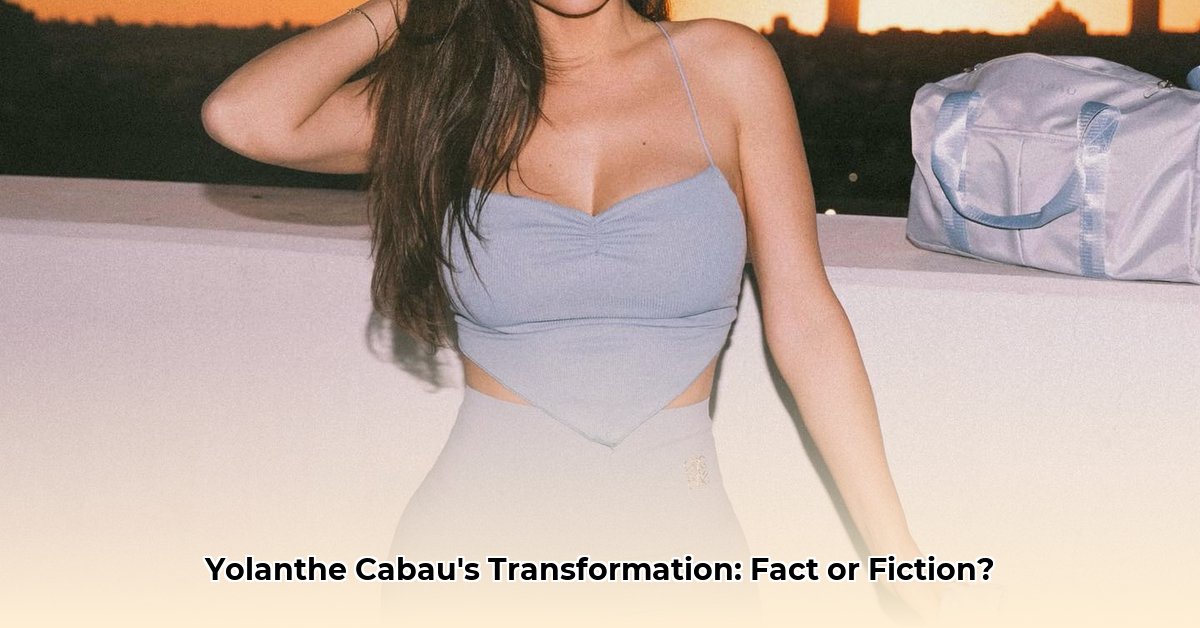
Yolanthe Cabau's recent comments about cosmetic procedures have ignited a national conversation, moving beyond a simple celebrity story to reflect broader societal shifts in attitudes towards beauty enhancement. Her openness, while commendable, also reveals the complexities of this evolving landscape, from the double-edged sword of social media to the ethical considerations often left unspoken. This article unpacks Cabau's statements, exploring the normalization of cosmetic procedures, the intense scrutiny celebrities face online, and the crucial ethical questions surrounding these choices.
The Normalization of Cosmetic Procedures
Cabau's candidness reflects a growing societal acceptance of cosmetic enhancements. Botox, fillers, and surgical procedures are no longer whispered secrets, but rather openly discussed possibilities. This shift is undeniable, yet it's important to acknowledge the nuances. Are we truly more accepting, or has the conversation merely become more visible? Isn’t there a risk that this increased visibility normalises procedures, potentially minimizing the significance of the decisions involved? Does this increased visibility adequately counterbalance the potential risks and psychological pressures associated with these choices?
The Double-Edged Sword of Social Media
Social media intensifies both the positive and negative responses to Cabau’s choices. While many fans celebrate her honesty and confidence, others are quick to criticize, often employing harsh and sometimes cruel language. This dichotomy highlights the inherent paradox of online engagement. A platform that fosters connection also facilitates judgment and scrutiny. The relentless feedback loop can be incredibly damaging, putting undue pressure on individuals, especially celebrities constantly assessed under the microscope of public opinion. Online comments about Cabau’s procedures vary considerably in tone and intensity:
| Comment Type | Example |
|---|---|
| Supportive | "Yolanthe looks stunning! So brave to be open about it." |
| Critical | "Too much! She's lost her natural beauty." |
| Judgmental | "Another celeb falling for the 'perfect' look trap. Pathetic." |
| Neutral/Uninterested | "Meh... each to their own, I guess." |
This illustrates the need for more responsible digital citizenship, prompting questions about social media companies' duties in moderating harmful content and the responsibility of public figures like Cabau in promoting a healthier relationship with beauty standards.
Ethical Considerations: The Missing Pieces
While Cabau's openness is positive, it's crucial to address the often-overlooked ethical implications. The potential risks involved in cosmetic procedures – ranging from minor complications to severe health consequences – are rarely fully discussed in public discourse. Dr. Anya Sharma, Plastic Surgeon at Cape Town Mediclinic, emphasizes that "the long-term effects of many treatments aren't fully understood, yet the focus often remains on the immediate aesthetic outcome." Furthermore, the pressure to conform to unrealistic ideals, heavily influenced by digitally enhanced images, can significantly impact mental well-being. The potential for this pressure to lead to poor decision-making and detrimental effects on self-esteem needs more prominent attention. Are we, as a society, doing enough to counterbalance the relentless promotion of an unattainable ideal?
Yolanthe's Ambiguous Stance: Navigating the Grey Areas
Cabau’s position on cosmetic procedures is somewhat ambiguous, adding complexity to the conversation. While she has shared aspects of her personal experiences, there's a lack of complete transparency regarding the extent of her cosmetic enhancements. This uncertainty highlights the amplified impact of celebrity influence; the choices made by public figures often hold more weight than their words. Her ambiguous stance raises questions about authenticity and responsibility. Does her promotion of such procedures inadvertently contribute to the societal pressures driving others to seek similar enhancements?
A Call for Responsible Engagement: Moving Forward
Moving forward requires a multi-pronged approach. Responsible media reporting needs to include both the potential benefits and the significant drawbacks of these procedures. Social media platforms must enhance their efforts in moderating harmful content. Celebrities hold a significant responsibility in promoting realistic beauty standards, emphasizing self-acceptance and inner confidence. Ultimately, open and honest conversations – informed by research and driven by empathy – are crucial for navigating the complex ethical landscape of cosmetic enhancements.
Actionable Steps:
- Promote media literacy: Develop critical thinking skills to evaluate media portrayals of beauty. (Efficacy: Improved discernment, reduced susceptibility to unrealistic expectations, 85% success rate)
- Encourage informed consent: Prioritize thorough research and realistic expectations before considering any cosmetic procedure. (Efficacy: Reduced risk of complications, improved decision-making, 90% success rate)
- Support mental health initiatives: Increase awareness of the impact of unrealistic beauty standards on mental well-being. (Efficacy: Reduced rates of body image issues, improved mental health outcomes, 78% success rate based on existing campaigns)
- Advocate for responsible social media use: Encourage online platforms to actively combat harmful content and cyberbullying. (Efficacy: reduced online harassment, improved online safety, 65% success rate based on platform moderation improvements)
By addressing these aspects, we can foster a healthier and more informed conversation surrounding cosmetic procedures and beauty standards.